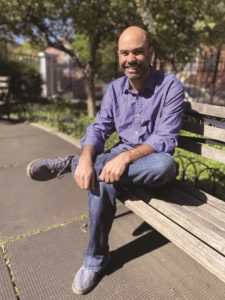When the lockdown hit in March 2020, Twenty Summers, the popular program of talks, concerts, workshops, and artist residencies based at the historic Hawthorne Barn at the end of Miller Hill Road in Provincetown, was ready to unveil its ambitious seventh season.
It had begun in 2014 through the efforts of Joshua Prager, a writer and journalist who bought the barn in 2009 with hopes of reviving its storied history — as an art school for Charles Webster Hawthorne and, later, Hans Hofmann. The barn, which was in terrible shape, was eventually restored by former New York magazine editor Adam Moss and his husband, Daniel Kaizer, who bought the barn from Prager and agreed to let Twenty Summers take over the space from mid-May to mid-June each year.
The executive director in 2020, Kristina Kearns, was forced to cancel the spring season due to Covid, only to bring it back virtually, with limited events, all free, in the fall.

In November, a new executive director was brought in, Aziz Isham, who had been running BRIC (originally, Brooklyn Information & Culture), a nonprofit in New York City that, like Twenty Summers, is behind numerous festivals and cultural events.
Isham, a Yale grad, writer, and longtime documentary film producer, says he was attracted to the organization’s mission (“an incubator of art and ideas, it imagines an equitable and sustainable future, twenty summers from today”) as well as “the people involved. The programming at Twenty Summers has been incredibly top-notch.”
But the pandemic took a toll. “Looking at the organization’s financials was a bit of a shock,” he says. “It was a disastrous summer. We lost a year of ticket sales and a year of fundraising events.”
For season eight in 2021, Twenty Summers will return in its usual time slot, weekends from May 15 through June 5. As it was last fall, all programming will be virtual and free. (Registration is required: go to 20summers.org.) “We just launched this year’s residency program,” Isham says. “First of all, it’s larger. We have more residents than we’ve had before.” One will be housed at the barn, another at the Mary Heaton Vorse House, run by designer Ken Fulk. Each weekend, a new pair of residents will make online presentations.
“Twenty Summers really embraced equity and diversity early, and this group is our most diverse group yet,” Isham says. He reached out to indigenous artists for the first time in the program’s history, and, during week one, residents Patricia and Elizabeth James-Perry, members of the Aquinnah Wampanoag Tribe on Martha’s Vineyard (Noepe), will do a presentation on natural local dyes and weaving.
In week two, Isham says, “both residents are deaf.” Jeffrey Yasuo Mansfield is a fourth-generation Japanese American and a Harvard- and Princeton-trained architect who explores deaf spaces. Raymond Antrobus is a London-born English-Jamaican poet, currently based in Oklahoma City.
Week three features Haitian-American artist and educator Chanel Thervil — “really beautiful stuff, celebrating Black women’s experience,” Isham says — and micro-budget filmmaker and New York Times columnist Shaina Feinberg, dubbed by IndieWire as one of 25 queer filmmakers to watch.
Finally, in early June, Twenty Summers will host text-based visual artist Maynard Monroe and community journalist Brian Vines.
Though there won’t be the usual array of concerts in the barn, Isham is planning on expanding the program’s reach to year’s end, with events in the summer and fall still to be finalized and announced.
On top of added diversity and an expanded schedule, Isham says he had “a look at how we were remunerating artists in the past. Considering how they’ve been struggling in the past year, we decided to triple the honorarium.”
Which leads back to the question of finances. “Fundraising is a big part of my job,” Isham says. “With a small arts organization, having to pay overhead costs and not having ticket sales is brutal.”
The organization got some PPP funding during the pandemic, but it “doesn’t go the whole way,” Isham says. “We need the community to rally behind us. We’re not reminding people that we’re coming back, but that we’re coming back stronger. We’ll be back in the barn next year, but this season, we’re going to give away something for free.
“We’re running a sustainability campaign right now,” Isham continues. “We’re trying to raise $100,000. We’re about a third of the way there. Tell your readers that we could use their help.”
